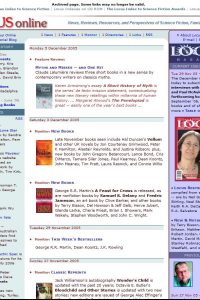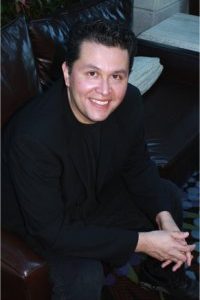Theodore Sturgeon: Roundtable Discussion
At Readercon in 2010 Locus organized a roundtable discussion on the works of Theodore Sturgeon to celebrate the landmark series from North Atlantic Books collecting his complete short fiction in 13 volumes, concluding with Case and the Dreamer (2010). The series was edited by Paul Williams, though Noël Sturgeon took over writing story notes in 2009 when Williams became too ill to continue.

Photo by Liza Groen Trombi
Noël Sturgeon is the late author’s daughter, Trustee of the Theodore Sturgeon Literary Trust, and a regular participant in choosing the winners of the annual Theodore Sturgeon Memorial Award. She is a  professor of Women’s Studies and American Studies at Washington State University, with a PhD in the history of consciousness from the University of California, Santa Cruz. She is the author of many books and articles on environmentalism, feminist theory, and social movements (among other topics), including Ecofeminist Natures: Race, Gender, Feminist Theory, and Political Action (1997) and Environmentalism in Popular Culture: Gender, Sexuality, Race, and the Politics of the Natural (2009).
professor of Women’s Studies and American Studies at Washington State University, with a PhD in the history of consciousness from the University of California, Santa Cruz. She is the author of many books and articles on environmentalism, feminist theory, and social movements (among other topics), including Ecofeminist Natures: Race, Gender, Feminist Theory, and Political Action (1997) and Environmentalism in Popular Culture: Gender, Sexuality, Race, and the Politics of the Natural (2009).
The other participants in the discussion were critics John Clute, Gary K. Wolfe, and Graham Sleight.
Noël Sturgeon: There’s a website the title of which is, ‘‘Why isn’t Theodore Sturgeon as well known as Philip K. Dick?’’ You get Paul Williams promoting them both, Jonathan Lethem promoting them both. But there’s movies made out of Dick.
Graham Sleight: There are movies that share the title of Dick stories.
Gary K. Wolfe: He did a Star Trek episode, didn’t he?
NS: He wrote three, two were aired. One was a very important episode in Star Trek lore because Spock gets a sex life and they use ‘‘Live Long and Prosper.’’ Nimoy came up with that. There was a Twilight Zone episode with Shelley Duvall. More than Human was optioned many times; it was optioned by Orson Welles. We used to call him Uncle Orson. But there’s never been a movie, and you can see why; it’s hard to turn a Sturgeon story into film.
GKW: They’re so internalized and so stylized; that’s the thing. Phil Dick was not a sentence by sentence writer like Sturgeon. Who were Ted’s best friends in the field?
NS: He didn’t have very close friends. But Robert Heinlein was a good friend, and Harlan Ellison.
John Clute: The [Heinlein] biography doesn’t talk about Sturgeon very much, but at one point Sturgeon said in a letter, ‘Bob, your fucking piety, your military gallantry, all this crap is actually very damaging to me personally,’ and Heinlein wrote back and said sorry. (I’m paraphrasing.)
GKW: And I know Phil Farmer was very fond of him. In the ’50s they were the only two people writing about sex in any form, especially gay sex.
NS: He was very close with Phil Klass when they were younger. He was there when Phil started writing. Of course Judy Merril he was close to for a while. He didn’t agree with Heinlein’s politics.
JC: He got right under Heinlein’s formidable guard.
GKW: He was doing stuff that Heinlein wanted to do.
GS: Is Stranger in a Strange Land Heinlein trying to do a Sturgeon novel?
NS: You can say this where I couldn’t, but I think that’s true. The dynamic there is they’re contemporaries, they’re friends, but they’re also competitors. They want to explode conventions around sex and religion, they’re both nudists, and yet their politics around economics, around the military, around people really were very different. I’m not going to say Ted was a feminist, but he was more careful of women than Heinlein.
GS: And around authority in general.
NS: Something I want to say about Stranger in a Strange Land. I don’t know if I want this to be in the interview or not. But they had this relationship. Heinlein started to write for the young adult market. He started to make money. I think Heinlein was like, ‘I’m going to write this.’ Ted started writing the book Godbody around the same time. And Godbody and Stranger in a Strange Land had a lot of similarities.
Ted felt that he couldn’t publish Godbody after Stranger in a Strange Land. It was too close, and too different. He started writing for the men’s market; I think Ted used to say, ‘If only I could really write about sex.’ Finally he got permission, he was able to do it, but I don’t think they’re that good. But there’s a story in Volume 12 that really reminds me of Heinlein. It’s called ‘The Country of Afterwards’. I think there was a tension between them. There was a little bit of competition. Who’s going to write about sex and religion, or sex as religion. And who’s the better stylistic writer.
GKW: Stranger in a Strange Land is dedicated to Phil Farmer, interestingly enough.
JC: And it comes straight out of the Heinlein and the Sturgeon of the late ’30s and ’40s, when Heinlein and Sturgeon knew each other, they had addictions and behaviors in common, I’m sure that Heinlein’s very explicit open marriage life was mapped by Sturgeon’s, well, not open marriage; he just slept around. This is what a lot of people did then. Heinlein wrote this utopia in 1938, For Us, the Living, which makes a lot of this very explicit.
GKW: We may not have a complete biography of Sturgeon but it’s there in those 13 volumes from North Atlantic. The one thing told to me by Phil Farmer and Harlan Ellison, and probably Silverberg would agree, is that by the late ’50s and early ’60s, everybody wanted to be able to write like Sturgeon, and nobody wanted his career. The question is how can you do both of these?
NS: Why should you have to choose? It’s because science fiction wasn’t considered literature.
GKW: It’s not just that. Science fiction readers were not necessarily turned onto the stylistic subtleties. This is one of the reasons why Gene Wolfe identifies with Sturgeon. Gene sees himself as an old-line SF writer who publishes in the magazines. There may be one out of 20 of his readers who understands what he’s doing.
JC: He’s almost certainly an example of a writer who was writing 30 or 40 years too early.
NS: I would like to see more people understand that. It is hard sometimes to see people write about the ’50s or the Golden Age, you hear Asimov and Heinlein and Clarke, and Sturgeon is just dropped. It’d be nice if this project will help people rediscover.
GKW: I think it’s going to depend on the rediscovery of the short story as an art form. The 13 volumes is an astonishing accomplishment, I’m glad we have it, but there’s no one of those volumes that represents his best work.
NS: That would be the next thing. In the middle of this we were asked to do a selected stories by Vintage; now having done this I would do it differently. I’m grateful for North Atlantic doing this; they took a financial risk, but they sold these books. Who’s buying them? Collectors, I guess? When I came to finish the last, I went back and looked because I wanted people to be able to buy the whole set. And there were three volumes that were gone, out of print, and people were selling them on Ebay for $150 a pop. I went to North Atlantic, and they’re reissuing those volumes in hardcover.
GKW: Do you feel your dad is getting to where he should be in American literature?
NS: No. I would like more recognition; I’d like to see more people talking about his work. When I talk to people who know his work, they don’t love every story, but people recognize that he’s an unusual writer. Yet there’s still a whole group of people who don’t know who he is.



 Excerpts from the discussion:
Excerpts from the discussion:



Thanks for posting this. Sturgeon’s work is tragically under-appreciated. The man and his work certainly deserve deeper study.
My introduction to SF came from “Mewhu’s Jet” in Astounding (1946) “Venus Plus X” meant a great deal to me, as did “The Dreaming Jewels” (which I read in French in the Belgian Congo in 1959 — Monetre/Maneater became Gannevale/Cannibale in “Les Joyaux Revants”). I have an SF novel coming out in South Africa on 20 June — and in my promotional talks I intend to give full weight to Theodore Sturgeon as a seminal figure in the golden age of SF. He will always be pure magic to me…